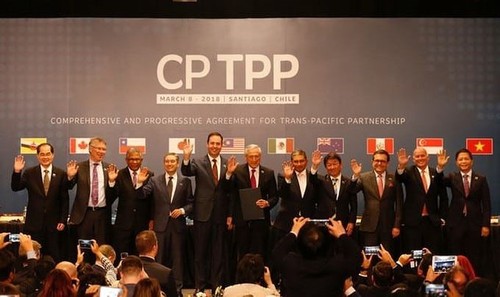
Representatives of 11 signatories to the CPTPP agreement in Chile.
(Photo: doanhnhanvietnam.org.vn)
|
The CPTPP represents a market that accounts for 13.5% of the global GDP and includes 500 million people. This opens new opportunities for Vietnam. Local sectors such as garments, textiles, footwear, food processing, beverages, confectionery, tobacco, wine, and beer will benefit most from the pact.
The deal creates opportunities for domestic firms to integrate into global value chains and gain advanced technologies from foreign partners.
Economists say there will also be challenges unless sufficient attention is paid to fulfilling integration commitments.
To maximize CPTPP benefits, Vietnamese enterprises should make or adjust their medium- and long-term business plans to boost the flow of commodities to potential markets.
Vietnam’s wood exports, for example, already the world’s 5th biggest timber exporter, the sector’s export revenue could double or even triple now that the CPTPP is lowering import tax rates.
Ly Vinh Hung, Director of Lyprodan Furniture, said:“The deal will reduce taxes. Prices of materials imported from CPTPP countries will drop. Our company is likely to benefit a lot from the CPTPP.”
Vietnam’s wood sector has participated in international furniture trade fairs, approached other CPTPP countries, diversified its product line, and adjusted its prices for various markets.
Dinh Thi Huong Nga, the Director of the Huong Nga Fine Arts Company, said: “Vietnam joining the CPTPP will attract more attention to its market. Vietnamese artisans are famous for their skill and offer competitive prices. Vietnam is now gaining experience in management, product design, and international trade.”
An abundant volume of orders and ready material resources make the target revenue of 9 billion USD from wood export set for this year achievable.
Vietnam also expects to experience a breakthrough from garment and textile exports because of the CPTPP. To that end, the industry needs to make a greater effort to meet to the standards set by CPTPP members, because it is highly dependent on imported materials.
 Nguyen Tien Truong, Vice President of the Vietnam Garment and Textile Group (Photo: baodautu.vn) Nguyen Tien Truong, Vice President of the Vietnam Garment and Textile Group (Photo: baodautu.vn)
|
Nguyen Tien Truong, Vice President of the Vietnam Garment and Textile Group, insists on creating new input material resources for sustainable export growth.
“Garment and textile companies tend to develop a domestic material supply resource, considering it a target. The sector always attaches importance to increasing its products’ added value which includes the production of fiber-based materials, identifying it as part of the competitive strategy of garment and textile firms,” said Truong.
What Vietnamese businesses are paying attention to is worker training and qualification improvement, especially in garments and textiles, footwear, and farm produce processing, as well as increasing links among enterprises to create more competitive items.